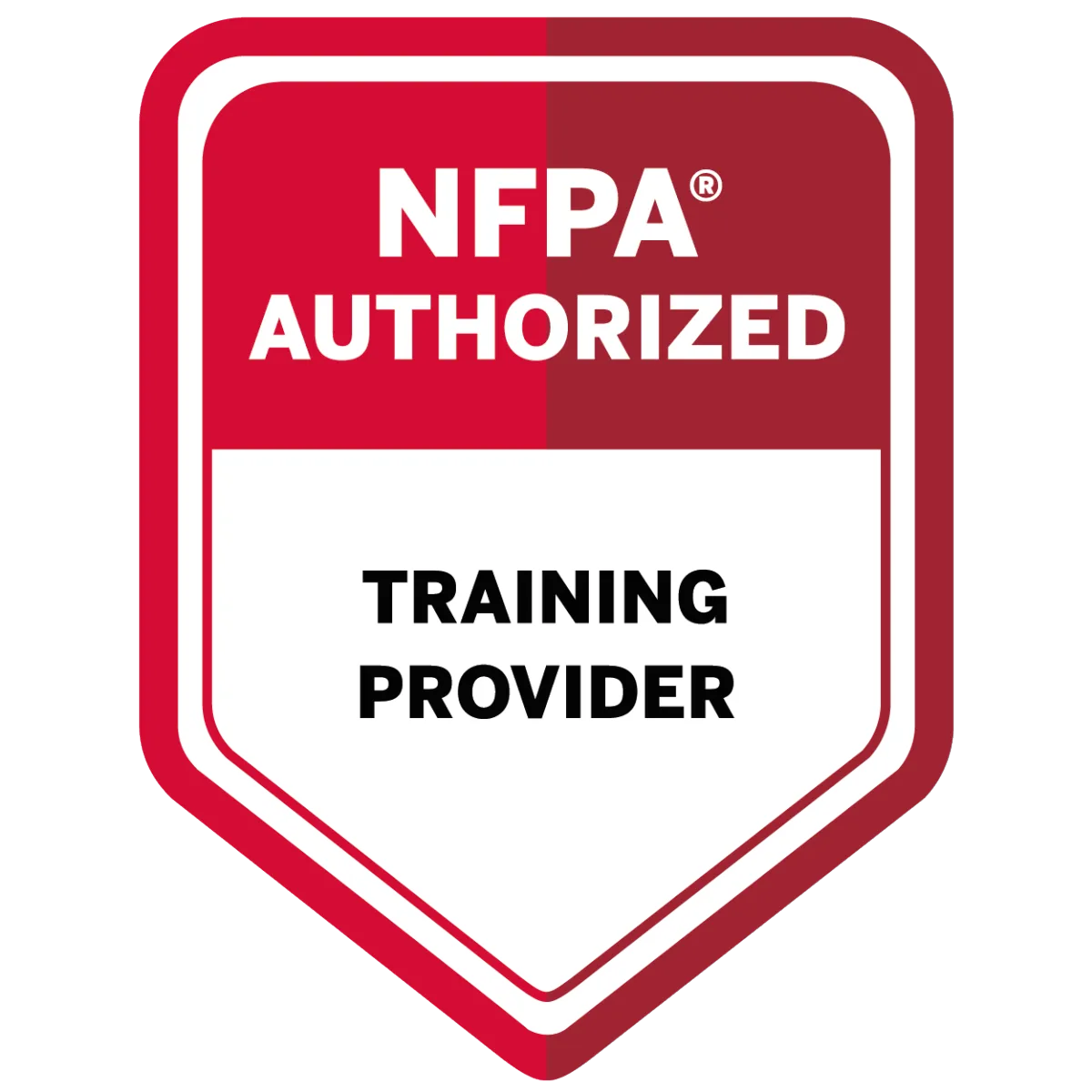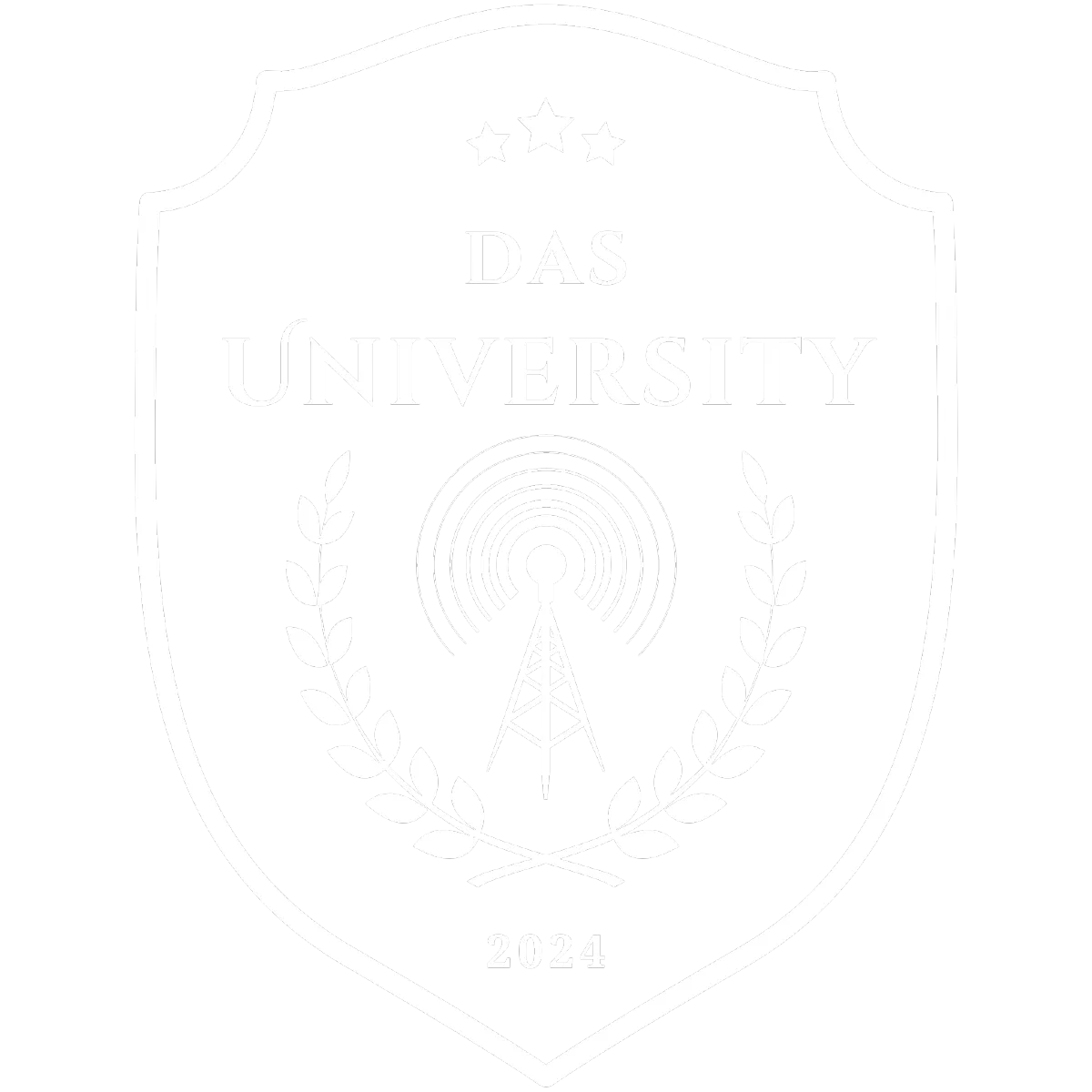WERE GOING ON TOUR!
JOIN THE DAS UNIVERSITY LIVE SUMMIT
2026 TRAINING CAMP TOUR
11 CAMPS NATION WIDE
Presented by GAMMA, BEST Ent. Mobili-fi and Industry Experts
Explore Our Unique Educational Platform
Join thousands of safety professionals, fire marshals, inspectors, integrators, and builders who are mastering the skills to install, certify, and inspect mission-critical in-building radio systems. With on-demand training, you can learn at your pace, apply it in the field, and start making buildings safer immediately.
Upgrade to our premium platform and gain the ability to earn DAS University training certificates and ICC continuing education credits for every hour of training completed. Whether you’re advancing your career, meeting code compliance requirements, or training your team, DAS University provides the recognition and real-world knowledge you need to lead with confidence.

Virtual Learning Environment
Step into our cutting-edge
virtual learning spaces, equipped with the latest tools and resources tailored for
DAS ERCES training. Experience live webinars, interactive certificate courses, and real-time collaboration with peers and instructors, ensuring an engaging and hands-on educational journey.

Professional Development
We train you on what matters: real installation standards, testing protocols, and life-saving communication system design. Our expert-led courses help you
earn DAS University training certificates, connect to job placement pipelines, and gain the confidence to lead projects with AHJs, architects, and public safety officials.

Global and Inclusive Community
Join a powerful network of safety-first professionals from across the country and around the world. With 24/7 access to our online campus, and a shared mission to protect lives, you’re never learning alone. DAS University is your community for growth, connection, and career elevation.
AUTHORIZED TRAINING PARTNERS OF THE BELOW ORGANIZATIONS

Earn CEU credits for every course on our Premium platform


About DAS University
Pioneering the Future of Education
At DAS University, we are redefining the educational landscape by integrating state-of-the-art technology with personalized learning experiences. Our mission is to empower students globally with the skills and knowledge necessary to excel in the fast-growing fields of
Distributed Antenna Systems (DAS) and Emergency Responder Communication Enhancement Systems (ERCES).
Through a blend of expert-led training courses, real-world applications
, and a supportive community, we provide an unparalleled learning journey for professionals and beginners alike.
Whether you're pursuing ERCES training, exploring advanced DAS education, or preparing for real-world challenges, we ensure you’re equipped for success. Join DAS University and transform your potential into leadership in the industry.
Achieve Training Certificates at DAS University
Elevate your professional profile with our highly regarded
DAS and ERCES training courses. Designed to provide both foundational and advanced expertise, these programs prepare you for real-world challenges in the
DAS and in-building communications industry.
Gain cutting-edge knowledge, practical skills, and DAS University training credentials to advance your career in public safety communications, emergency responder technologies, and beyond.
Hands-on project submissions
Industry-recognized guest speakers
Collaboration with 30+ industry partners
Real-time system testing simulations
Access to exclusive ERCES webinars
Unlock Your Career Potential with DAS University Training Certificates
Our DAS and ERCES training certificates document your completion—they open doors to new professional opportunities in the growing field of in-building communication systems.
Our training program participants develop practical skills for the industry, DAS University powered by Gamma is your gateway to professional growth and success. Whether you’re aiming for job placements, advanced career counseling, or building connections within a robust network of industry leaders, our programs are designed for your advancement.
Sign up now for FREE and start your journey toward professional excellence with DAS University!

Integrating DAS with Smart Building Systems for Enhanced Safety and Efficiency
As technology continues to advance, the concept of smart buildings has become increasingly prevalent. Smart buildings leverage interconnected systems and advanced technologies to improve safety, efficiency, and the overall occupant experience. Distributed Antenna Systems (DAS) play a crucial role in this ecosystem by ensuring reliable wireless communication, which is essential for the functioning of smart building technologies. At DAS University, we focus on educating professionals about the integration of DAS with smart building systems to maximize safety and efficiency. This blog post explores the benefits, applications, and strategies for integrating DAS with smart building systems.
Understanding Smart Building Systems
Smart building systems use a network of sensors, devices, and software to manage and control various building functions, such as lighting, HVAC, security, and energy management. These systems communicate over wireless networks, enabling real-time monitoring, automation, and optimization of building operations.
Benefits of Integrating DAS with Smart Building Systems
Enhanced Safety
Reliable Communication: DAS ensures that emergency communication systems, such as fire alarms and public safety radios, operate reliably throughout the building, enhancing occupant safety during emergencies.
Real-Time Alerts: Integration with smart systems allows for real-time alerts and notifications to be sent to emergency responders, building managers, and occupants, facilitating swift and coordinated responses.
Improved Efficiency
Energy Management: Smart building systems use data from sensors to optimize energy consumption. DAS provides the robust communication backbone needed for these systems to function effectively, leading to significant energy savings.
Automated Control: With DAS supporting reliable wireless communication, smart building systems can automate various functions, such as adjusting lighting and HVAC settings based on occupancy and usage patterns.
Enhanced Occupant Experience
Seamless Connectivity: DAS ensures consistent wireless coverage throughout the building, allowing occupants to stay connected and access smart building features without interruption.
Comfort and Convenience: Smart systems enhance occupant comfort and convenience by providing personalized control over their environment, such as temperature, lighting, and security settings.
Operational Insights
Data-Driven Decisions: Integration of DAS with smart systems provides building managers with detailed insights into building operations, enabling data-driven decisions to improve efficiency and reduce costs.
Predictive Maintenance: Smart systems can monitor the health of building systems and predict maintenance needs. DAS ensures these systems stay connected, enabling proactive maintenance and reducing downtime.
Applications of DAS in Smart Buildings
Security and Surveillance
Enhanced Coverage: DAS ensures that security cameras and sensors maintain reliable connectivity, providing continuous surveillance coverage throughout the building.
Real-Time Monitoring: Security personnel can receive real-time alerts and monitor the building remotely, enhancing security and response times.
Building Automation Systems (BAS)
Integrated Control: DAS supports wireless communication for building automation systems, allowing centralized control of lighting, HVAC, and other systems for improved efficiency.
Environmental Monitoring: Sensors connected via DAS can monitor environmental conditions, such as air quality and temperature, and adjust settings automatically to maintain optimal conditions.
Energy Management Systems
Optimized Consumption: Smart energy management systems use data from sensors to optimize energy use. DAS ensures these systems have reliable communication, enabling real-time adjustments and significant energy savings.
Renewable Integration: DAS can support the integration of renewable energy sources, such as solar panels, into the building’s energy management system, enhancing sustainability.
Public Safety Communication
Emergency Responder Radio Coverage: DAS ensures that emergency responders have reliable communication throughout the building, enhancing their ability to coordinate and respond effectively.
Mass Notification Systems: DAS supports mass notification systems, enabling rapid dissemination of critical information to occupants during emergencies.
Strategies for Effective Integration
Comprehensive Planning and Design
Site Survey: Conduct a thorough site survey to understand the building’s layout, potential interference sources, and specific communication needs.
Custom Design: Design the DAS to address the unique requirements of the building, ensuring comprehensive coverage and integration with smart building systems.
Collaboration with Stakeholders
Engage Early: Collaborate with building managers, IT staff, and system integrators early in the planning process to ensure alignment and address any concerns.
Regular Communication: Maintain open lines of communication throughout the project to ensure all stakeholders are informed and involved.
Technology Compatibility
Future-Proof Design: Design the DAS with scalability and future technology upgrades in mind, ensuring it can accommodate new smart building technologies as they emerge.
Standards Compliance: Ensure the DAS complies with relevant industry standards and regulations to guarantee compatibility and performance.
Ongoing Maintenance and Monitoring
Regular Testing: Conduct regular testing and maintenance of the DAS to ensure it continues to perform optimally and supports smart building systems effectively.
Real-Time Monitoring: Implement real-time monitoring tools to track the performance of the DAS and smart building systems, allowing for prompt issue resolution and continuous optimization.
Conclusion
Integrating Distributed Antenna Systems (DAS) with smart building systems is essential for enhancing safety, efficiency, and occupant experience in modern buildings. By providing reliable wireless communication, DAS supports the seamless operation of smart technologies, enabling real-time monitoring, automation, and optimization of building functions. At DAS University, we are dedicated to educating professionals on the latest advancements in DAS and smart building integration, preparing them to design and implement cutting-edge solutions that drive the future of building technology. Join us to explore the transformative potential of DAS and smart building systems and become a leader in creating safer, more efficient, and connected environments.
Hear Directly from Our Students: Real Stories, Real Success
Discover the impact of DAS University through the voices of our students. From groundbreaking education to career breakthroughs, our learners share their journeys and the transformative experiences they've encountered.

DAS University not only taught me the technical skills needed for advanced DAS systems but also how to apply them effectively in real-world scenarios. The network I’ve built through the university’s alumni connections has opened up numerous opportunities for collaboration and growth.

Raj Patel

The DAS training certificate has been beneficial for my career. The practical knowledge and hands-on training I received have allowed me to transition into a higher role within my company. The support and expert advice from faculty were invaluable.

Emily Nguyen

Enrolling at DAS University was one of the best decisions I've made for my professional development. The interactive courses and live sessions with industry experts have greatly enhanced my understanding and confidence in handling complex projects in my field.

Albert Dubois
Start Your Journey at DAS University Today
Embark on a transformative path of discovery and professional growth with our cutting-edge
DAS and ERCES training courses and a vibrant academic community. At DAS University, we provide the tools, resources, and industry connections to help you not just meet but exceed your career aspirations in the fields of
Distributed Antenna Systems (DAS) and Emergency Responder Communication Enhancement Systems (ERCES).
Whether you’re aiming to gain DAS University training certificates, explore real-world applications, or network with industry professionals, DAS University is here to turn your potential into measurable success.
Our Latest Articles

Integrating DAS with Smart Building Systems for Enhanced Safety and Efficiency
As technology continues to advance, the concept of smart buildings has become increasingly prevalent. Smart buildings leverage interconnected systems and advanced technologies to improve safety, efficiency, and the overall occupant experience. Distributed Antenna Systems (DAS) play a crucial role in this ecosystem by ensuring reliable wireless communication, which is essential for the functioning of smart building technologies. At DAS University, we focus on educating professionals about the integration of DAS with smart building systems to maximize safety and efficiency. This blog post explores the benefits, applications, and strategies for integrating DAS with smart building systems.
Understanding Smart Building Systems
Smart building systems use a network of sensors, devices, and software to manage and control various building functions, such as lighting, HVAC, security, and energy management. These systems communicate over wireless networks, enabling real-time monitoring, automation, and optimization of building operations.
Benefits of Integrating DAS with Smart Building Systems
Enhanced Safety
Reliable Communication: DAS ensures that emergency communication systems, such as fire alarms and public safety radios, operate reliably throughout the building, enhancing occupant safety during emergencies.
Real-Time Alerts: Integration with smart systems allows for real-time alerts and notifications to be sent to emergency responders, building managers, and occupants, facilitating swift and coordinated responses.
Improved Efficiency
Energy Management: Smart building systems use data from sensors to optimize energy consumption. DAS provides the robust communication backbone needed for these systems to function effectively, leading to significant energy savings.
Automated Control: With DAS supporting reliable wireless communication, smart building systems can automate various functions, such as adjusting lighting and HVAC settings based on occupancy and usage patterns.
Enhanced Occupant Experience
Seamless Connectivity: DAS ensures consistent wireless coverage throughout the building, allowing occupants to stay connected and access smart building features without interruption.
Comfort and Convenience: Smart systems enhance occupant comfort and convenience by providing personalized control over their environment, such as temperature, lighting, and security settings.
Operational Insights
Data-Driven Decisions: Integration of DAS with smart systems provides building managers with detailed insights into building operations, enabling data-driven decisions to improve efficiency and reduce costs.
Predictive Maintenance: Smart systems can monitor the health of building systems and predict maintenance needs. DAS ensures these systems stay connected, enabling proactive maintenance and reducing downtime.
Applications of DAS in Smart Buildings
Security and Surveillance
Enhanced Coverage: DAS ensures that security cameras and sensors maintain reliable connectivity, providing continuous surveillance coverage throughout the building.
Real-Time Monitoring: Security personnel can receive real-time alerts and monitor the building remotely, enhancing security and response times.
Building Automation Systems (BAS)
Integrated Control: DAS supports wireless communication for building automation systems, allowing centralized control of lighting, HVAC, and other systems for improved efficiency.
Environmental Monitoring: Sensors connected via DAS can monitor environmental conditions, such as air quality and temperature, and adjust settings automatically to maintain optimal conditions.
Energy Management Systems
Optimized Consumption: Smart energy management systems use data from sensors to optimize energy use. DAS ensures these systems have reliable communication, enabling real-time adjustments and significant energy savings.
Renewable Integration: DAS can support the integration of renewable energy sources, such as solar panels, into the building’s energy management system, enhancing sustainability.
Public Safety Communication
Emergency Responder Radio Coverage: DAS ensures that emergency responders have reliable communication throughout the building, enhancing their ability to coordinate and respond effectively.
Mass Notification Systems: DAS supports mass notification systems, enabling rapid dissemination of critical information to occupants during emergencies.
Strategies for Effective Integration
Comprehensive Planning and Design
Site Survey: Conduct a thorough site survey to understand the building’s layout, potential interference sources, and specific communication needs.
Custom Design: Design the DAS to address the unique requirements of the building, ensuring comprehensive coverage and integration with smart building systems.
Collaboration with Stakeholders
Engage Early: Collaborate with building managers, IT staff, and system integrators early in the planning process to ensure alignment and address any concerns.
Regular Communication: Maintain open lines of communication throughout the project to ensure all stakeholders are informed and involved.
Technology Compatibility
Future-Proof Design: Design the DAS with scalability and future technology upgrades in mind, ensuring it can accommodate new smart building technologies as they emerge.
Standards Compliance: Ensure the DAS complies with relevant industry standards and regulations to guarantee compatibility and performance.
Ongoing Maintenance and Monitoring
Regular Testing: Conduct regular testing and maintenance of the DAS to ensure it continues to perform optimally and supports smart building systems effectively.
Real-Time Monitoring: Implement real-time monitoring tools to track the performance of the DAS and smart building systems, allowing for prompt issue resolution and continuous optimization.
Conclusion
Integrating Distributed Antenna Systems (DAS) with smart building systems is essential for enhancing safety, efficiency, and occupant experience in modern buildings. By providing reliable wireless communication, DAS supports the seamless operation of smart technologies, enabling real-time monitoring, automation, and optimization of building functions. At DAS University, we are dedicated to educating professionals on the latest advancements in DAS and smart building integration, preparing them to design and implement cutting-edge solutions that drive the future of building technology. Join us to explore the transformative potential of DAS and smart building systems and become a leader in creating safer, more efficient, and connected environments.
Frequently Asked Questions
What makes DAS University different from traditional educational institutions?
DAS University combines expert-led courses, dynamic online interactions, and live events to create a comprehensive and interactive learning experience that goes beyond traditional classroom boundaries.
How does the subscription model work at DAS University?
Our subscription model offers unlimited access to all courses and resources on the platform, allowing students to learn at their own pace and according to their own schedules. Enjoy a FREE version and premium version
What types of courses does DAS University offer?
We offer a wide range of courses focused on Distributed Antenna Systems (DAS), including basics of radio frequency, system design, and emergency responder communication enhancement systems, among others.
Can I interact directly with instructors and guest speakers?
Yes, our platform includes real-time chat, discussion forums, and weekly live Zoom sessions where students can engage directly with instructors and industry experts.
What are the career opportunities after completing courses at DAS University?
Completing courses at DAS University can lead to various roles in the DAS industry, such as system integrator, radio technician, and various positions in emergency response, depending on the course.
How do I access the digital library?
The digital library is available through the Campus portal, where students can access research papers, case studies, e-books, and multimedia resources related to their courses.
What is included in the certification from DAS University?
Training certificates include your name, course title, completion date, unique certificate number, and document your completion of DAS University training programs
How can I participate in special interest groups and clubs?
Students can join various groups and clubs through the Campus portal, allowing them to connect with peers who share similar interests and professional goals. Premium Version only
Are there resources for hands-on learning in DAS University courses?
Yes, we provide simulation tools and virtual labs for hands-on experience, as well as gamified learning modules to make complex concepts more engaging. Only available in the Premium version.
What support is available if I encounter difficulties in my coursework?
The Feedback and Support Center offers direct access to faculty and technical support to assist with any course-related inquiries.
How does DAS University accommodate international students?
We offer 24/7 campus access and multilingual support to ensure that students from all time zones and linguistic backgrounds can fully participate.
What is the process for obtaining certification at DAS University?
To obtain a training certificate, students must complete all modules, pass the final assessment with a required minimum score, and actively participate in live sessions and forums. Only available in the Premium version.
Can I share my certification on professional networks?
Yes, upon completion, students receive both a physical training certificate and a digital badge that can be shared on LinkedIn and other professional networks. Only available in the Premium version.
What are the live webinar auditoriums used for?
The auditoriums host weekly live sessions with guest speakers and industry pofessionals, featuring interactive Q&A sessions and panel discussions.
What tools are available for career development at DAS University?
Our Career Center provides career counseling, resume workshops, job postings, and an alumni network for mentorship and professional connections. Only available in the Premium version.
How can I track my course progress and assessments?
The Certification Portal on our platform allows students to track their progress, assessments, and training certificate status.
What kind of assessments are used in DAS University courses?
Assessments include quizzes, assignments, project submissions, and a final examination to comprehensively test understanding and practical application.
How can I continue learning after completing my courses?
Certificate holders are encouraged to participate in advanced courses, seminars, and periodic refresher courses to keep their knowledge current.
Are there opportunities for networking within the DAS University community?
Yes, training certificate completion grants access to an alumni network, facilitating peer interactions, knowledge sharing, and networking opportunities. Only available in the Premium version.
How do I provide feedback on my learning experience?
Students can provide feedback through forums in the Feedback and Support Center, helping us to continually improve the campus experience.


